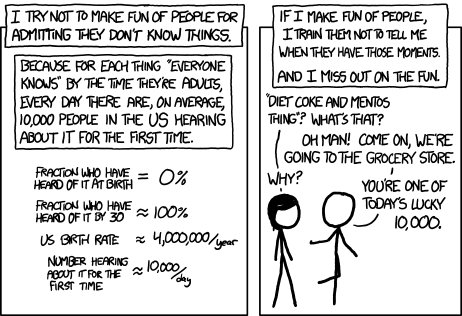By now it’s pretty clear where I stand on the idea of gatekeeping for geek culture – those gates should be open and everyone welcome inside. For the most part, I like to think most geeks and nerds want there to be more people to play with and share their excitement and enthusiasm with. Calling out gatekeeping for what it is helps keep those doors open, and it doesn’t hurt at all when people whose social privilege can allow for their voices to carry farther speak up in support.
John Siracusa’s piece, “The Road to Geekdom,” has some lovely sentiments about what geekdom has meant to him and why it should be open to everyone. However, I have a slight quibble with Siracusa’s conclusion, which I think is well-intentioned, but missing a larger point about how that entryway to geekdom can be harder to step through for people who aren’t part of the perceived majority (read: straight white cis men):
(Bolding mine for emphasis)
“Anyone trying to purposely erect border fences or demanding to see ID upon entry to the land of Geekdom is missing the point. They have no power over you. Ignore them and dive headfirst into the things that interest you. Soak up every experience. Lose yourself in the pursuit of knowledge. When you finally come up for air, you’ll find that the long road to geekdom no longer stretches out before you. No one can deny you entry. You’re already home.”
I understand what Siracusa is trying to say – that it’s a shame to let someone else’s prejudice prevent you from enjoying the things you love and being part of the communities you want to be in. It is a shame, and were geekdom a level playing field, it would be a lot easier to ignore the naysayers and gatekeepers and be part of the fandoms you love. The problem with this conclusion (and it’s one that I’ve seen often and heard repeatedly) is that it rests on the assumption that all geeks and nerds face the same obstacles entering geekdom. The intention of the “just ignore it and do what you want” advice is well-meaning, but it studiously ignores the fact that geekdom isn’t a level playing field, which is precisely part of the gate-keeping issue in the first place. Just ask anyone who’s ever been a woman, a person of color, or LGBTQ in fandom, at cons, in gaming, in comics, at the movies, or any other kind of geeky, nerdy gathering.
Thanks to how normalized different forms of discrimination have become, there are people who do have power over determining who gets in the gates, even if they don’t know they’re exercising it. The active gatekeepers may not be able to actually lock the door, but they can make the room so toxic that staying isn’t an option. Anyone who’s ever had to deal with textbook Derailing for Dummies responses when trying to point out how words and actions are problematic and making an environment not all that welcoming knows how quickly fighting to open that door can become too tiring to continue, and your best option is to leave.
Further complicating matters is that one can contribute to that toxic atmosphere even if one doesn’t intend to. The problem with having social privilege is that it can insulate you from seeing how normalized and incessant problems like microaggressions and Othering are. For all intents and purposes, they don’t exist for you, which helps create the erroneous perception that the only thing keeping others from entering geekdom is themselves. After all, no one can legally bar someone from attending a con or an open-to-the-public event based on race, gender, sexual orientation or sexual identity, so what is really standing in the way?
Just ignore the casual bigotry, the claims that you’re going to ruin Doctor Who if the Doctor’s ever a woman, that scifi is being ruined by girl cooties and being told you just don’t understand what this fandom is about because you hold a different opinion. Why not be flattered being told that you’re not like those “other” silly fangirls, when people are surprised that you’re a black woman who cosplays (and nevermind the angry racial invective when you don’t cosplay a black character). Brush off being told that you’re overreacting because that guy was just being awkward hitting on you, being asked what’s the problem with booth babes and chainmail bikinis, and having people say that you’re not a “real geek” because you’re only here to be “con hot.” It’s not a big deal that movie studios think it’s “difficult” to make a Black Panther movie because they’d have to create Wakanda from the ground up (but haven’t had that problem with Asgard), that Wonder Woman’s being introduced as back up for Batman and Superman rather than in her own film (and hey, the woman they cast is just too skinny!), or that straight male fans complain that adding same-sex romance options in a game is “ignoring their main demographic.” None of that can actually stop you from entering geekdom and it’s a great place for everyone to be in – just hold your nose, close your eyes or stop up your ears if that’s what it takes to come inside and stay, right?

Just ignore people being discriminatory and I can enjoy what I want? What a novel idea, I’d never tried or thought of that before!
Dismissing or ignoring how much of a barrier institutionalized discrimination can still be for people in marginalized groups can have the unintended effect of putting them “at fault” if they can’t “get into geekdom” because if “no one can deny you entry”, if you’re not inside, it’s because you haven’t made the effort of entering. You can’t alter gatekeeping or other exclusionary practices and politics by pretending they’re not there. The implicit result of doing so denies and delegitimizes people’s experiences of discrimination and puts the onus to fix that exclusion on the people who are being excluded in the first place. Being able to think that fixing exclusion is as simple as not letting anyone stand in your way is a luxury that isn’t always afforded to many people who have been fighting against gatekeeping.
Do I want more people to come into geekdom and join me? Oh hell yes! I’d love more people to come on in and join the party, but inclusion in geekdom won’t happen without those who are already inside doing their part to keep those doors open, make it clear that everyone is welcome, and be willing to acknowledge and work on the problems that still exist. In place of Siracusa’s conclusion, I’d offer a slightly different take (my changes in bold):
“Speak up in support when others point out barriers to entry in Geekdom. Talk about why building fences and demanding IDs to entry is missing the point. Dive headfirst into the things that interest you and invite others along for the ride. Soak up and share every experience. Lose yourself in the pursuit of knowledge. When you finally come up for air, you’ll find that the long road to geekdom no longer stretches out before you alone, so share the lane. Don’t deny others entry to geekdom, offer your hand and invite them in. Work together to make geekdom a home for anyone who wants to be there.”
When someone’s been thrown out your house and told repeatedly that they’re not wanted and to go away, they’re not going to be all that inclined to blithely come right in and feel comfortable just because you say you’ve changed your mind. Open door policies aren’t enough – if we want people to be at home in geekdom, we have to put the effort into inviting them in and making them feel welcome, too. Because geekdom can absolutely be a fantastic place to share with others, if only we can make it so for everyone.

“Ten Thousand” by XKCD http://xkcd.com/1053/


Did you follow the links under the text “opportunity,” “social class,” “race,” “sex,” and “gender” in the article? I even used italics on the second instance of “opportunity” to further emphasize it.
Others can put up barriers to participation in their (often toxic) communities, but my main point was that no one can stop you from becoming a ” geek.” You don’t need validation from others for that. You just need the opportunity (see above) to turn your enthusiasm into knowledge.
I tried to put the word [topic] (with angled brackets instead of square) in front of “geek” in the above, but the comment system ate it. So, “[topic] geek” meaning a geek in any particular topic.
John, I think perhaps this is rooted in a divergent interpretation of the word “geekdom”. It seems for you, it means “the condition of taking joy in delving deeply in to the minutiae of a hobby”. And indeed, in this modern age where if you’re within Amazon’s delivery reach, you can have nearly anything your budget can afford you, it’s nearly impossible to gatekeep. You addressed some of the economic issues in your blog, and I appreciate that touch.
The problem is that if one thinks of “geekdom” as a communal activity, as an action of group discussion and participation, as a non-solo act…then there are definitely means of gatekeeping…and as Michi outlines above, these can be quite significant.
You are not wrong. It is possible to become an [$interest]geek as a solo practitioner. Some people hunger for a sense of community, and thus organizations like Chicago Nerd Social Club and various fan-run conventions (if they want to be truly welcoming) need to be mindful of the community space they create by their policies and actions.
Yes, I was addressing the “imposter syndrome” where people might not feel like they are—or can ever be—”real [topic] geeks” because they haven’t been doing [topic] since birth or aren’t like the typical [topic] geek in some way (age, geography, race, gender, etc.)
The social aspect of geekdom is another matter, and one where the solutions are not so simple.
(My apologies for the double response. My computer crashed between the two, and evidently sent out a Hail Mary post I was unaware of. Please delete the first and this note, leaving the long version.)
I’ve seen this a lot with people of both genders who are v. smart at STEM fields, but have non-geeky/nerdy personalities. I’ve seen plenty of socially skilled, cute girls who enter Physics or Math programs being simultaneously derided and hit upon. In one case, the girl (the only one in her cohort at a competitive Physics program) complained to the Dean of Student about a male peer trying to pull her down on to the couch in the student lounge. When he was reprimanded, all her other male peers stopped talking to her.
Danica McKeller has spoken of instructors who refused to acknowledge her mathematical ability, because she was a pretty teenager – and an actress.
http://en.wikipedia.org/wiki/Danica_McKeller
Pingback: Links & Misc. — Spring Cleaning! — Part 3 | The Open Window